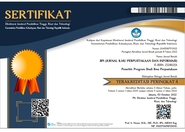INTERNALIZATION OF MORAL VALUES IN THE BOOK RASYSY AL-BARAD BY MUḤAMMAD LUQMĀN: A STUDY OF CLASSICAL TEXT-BASED INFORMATION LITERACY
Abstract
Keywords
Full Text:
PDFReferences
Al-Ghazali. (2000). Ihya' ‘Ulūm al-Din [The Revival of Religious Sciences]. Beirut: Dar al-Kutub al-‘Ilmiyyah.
Al-Zarnūji. (2003). Ta‘lim al-Muta‘allim Ṭariq al-Ta‘allum [Instruction of the Student: The Method of Learning]. Cairo: Dar al-Fikr.
Dalimunthe, M. A., Syam, A. M., Suhendar, A., & Al-Mujtahid, N. M. (2024). Deconstructing Islamic cyberculture: Mitigating inferiority and cancel culture in virtual space. OPINI: Journal of Communication and Social Science, 1(2), 12-26.
Fatimah, U. (2024). Peran Orang Tua dalam Menanamkan Nilai-Nilai Akhlak Terhadap Anak Remajanya di Desa Durian Bungkuk Kecamatan Batu Ampar Kabupaten Tanah Laut.
Gee, J. P. (2004). Situated Language and Learning: A Critique of Traditional Schooling. Routledge.
Hasanah, Nur. (2023). Metode Penelitian Kepustakaan, PT. Literasi Nusantara Abadi Grup.
Humaizi, Hasan, N. N. N., Dalimunthe, M. A., & Ramadhani, E. (2024). Harmony in virtual space: Forum Kerukunan Umat Beragama (FKUB) development communication in creating digital literacy based on religious moderation. Journal of Infrastructure, Policy and Development, 8(7), 4299. https://doi.org/10.24294/jipd.v8i7.4299
Indainanto, Y. I., Dalimunthe, M. A., Sazali, H., Rubino, & Kholil, S. (2023). Islamic communication in voicing religious moderation as an effort to prevent conflicts of differences in beliefs. Pharos Journal of Theology, 104(4). https://doi.org/10.46222/pharosjot.104.415
Kholil, S., Ismail, I., Dalimunthe, M. A., Suhendar, A., & Rambe, R. F. A. K. (2024). Strengthening religious moderation through PTKIN and SIT collaboration to build social harmony. JIPI (Jurnal Ilmu Perpustakaan dan Informasi), 9(2), 228-236.
Luqman, Muhammad. (2009). Rasysy al-Barad Syarah Adab al-Mufrad, Terj. M. Taqdir Arsyad, Jakarta: Griya Ilmu.
Nasr, S. H. (2006). The Garden of Truth: The Vision and Promise of Sufism, Islam's Mystical Tradition. HarperOne.
Owusu-Ansah, E. K. (2004). Information literacy and the academic library: A critical look at a concept and the controversies surrounding it. The Journal of Academic Librarianship, 30(1), 3-13. https://doi.org/10.1016/j.acalib.2003.11.006
Rosenthal, F. (2007). Knowledge Triumphant: The Concept of Knowledge in Medieval Islam. Brill.
Revalina, A., Moeis, I., & Indrawadi, J. (2023). Degradasi Moral Siswa-Siswi Dalam Penerapan Nilai Pancasila Ditinjau Dari Pendidikan Kewarganegaraan Sebagai Pendidikan Karakter. Jurnal Moral Kemasyarakatan, 8(1), 24-36.
Santoso, R., Subandono, J., & Fatimah, M. (2023). Analisis Faktor Penyebab Rendahnya Semangat Siswa MI Muhammadiyah Derasan Andong Boyolali Tahun Pelajaran 2022/2023. Di Turots: Jurnal Pendidikan Islam, 1069-1084.
Sikumbang, A. T., Dalimunthe, M. A., Kholil, S., & Nasution, N. F. (2024). Digital da'wah Indonesia ulema in the discourse of theology. Pharos Journal of Theology, 105(1), 1-14. https://doi.org/10.46222/pharosjot.1051
Sukardi. (2016). Literasi transformatif dalam pendidikan pesantren. Jurnal Pendidikan Islam, 2(1), 23-35. https://doi.org/10.15575/jpi.v2i1.1639
Syam, A. M., Dalimunthe, M. A., Suhendar, A., & Rambe, R. F. A. K. (2024). Islamic philosophy: A comparative perspective between Ibnu Khaldun and Karl Marx. SYAHADAT: Journal of Islamic Studies, 1(2), 55-72.
DOI: http://dx.doi.org/10.30829/jipi.v10i1.25729
Refbacks
- There are currently no refbacks.
Copyright (c) 2025 Yessy Tesya Ningsih Siagian, Junaidi Arsyad, Sapri Sapri

This work is licensed under a Creative Commons Attribution-ShareAlike 4.0 International License.










_1.png)
.png)
_.png)

